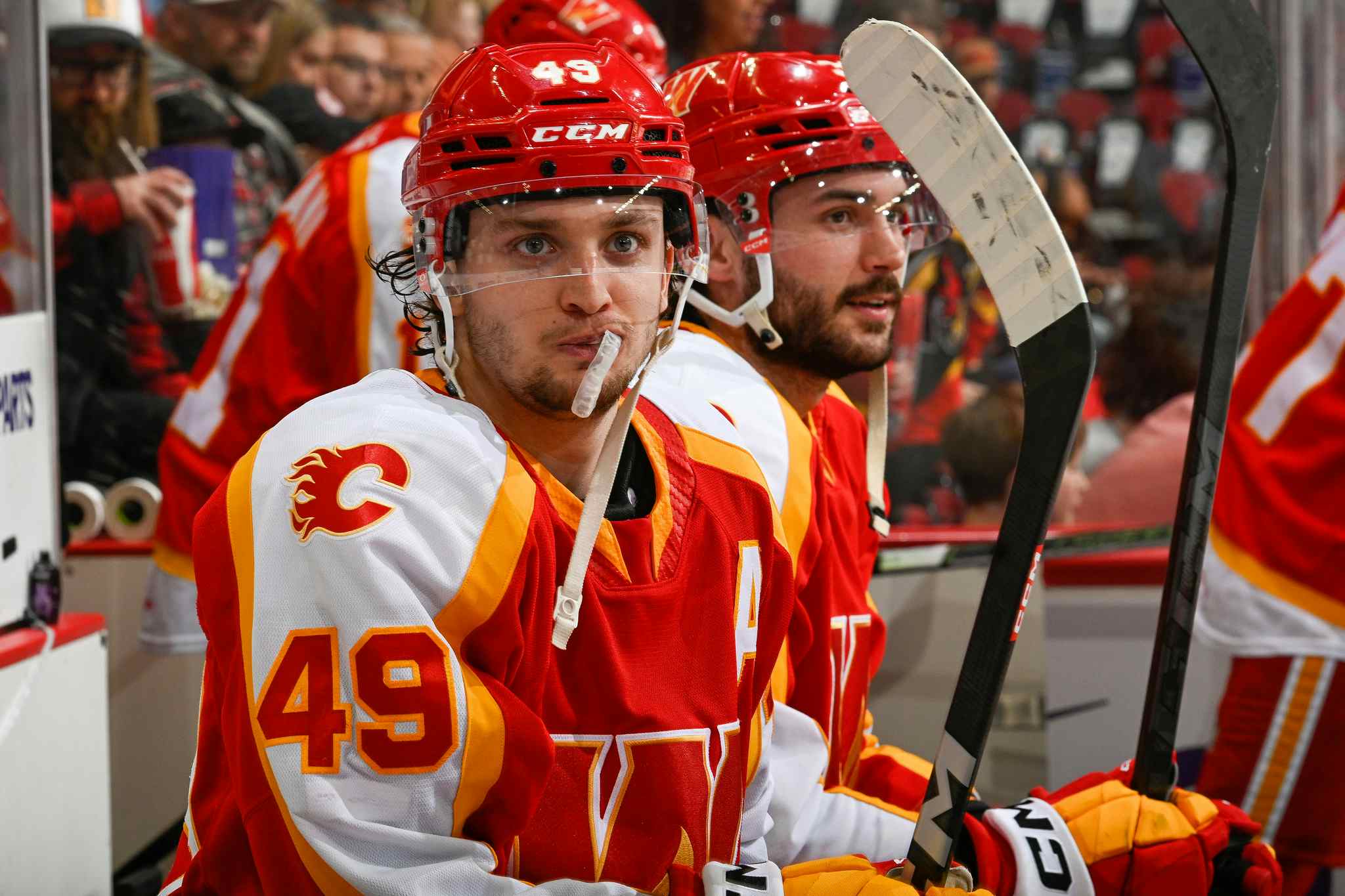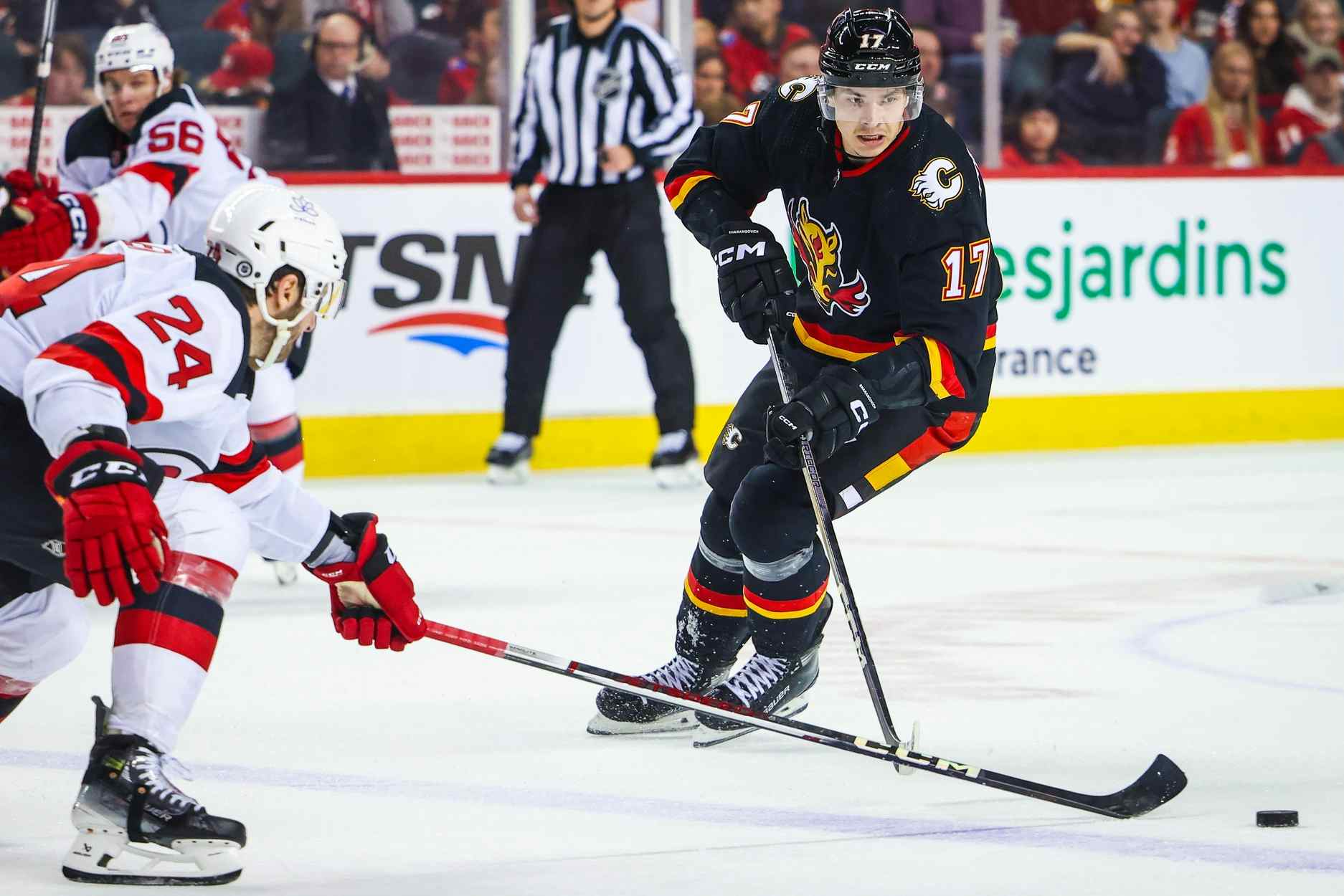Flames All Time Top 10 Draft Picks – #2 Brett Hull

When you’re a kid that is drafted into the NHL in the first round, the honour unfortunately also comes with its share of pressure and expectations. When you’re the son of an NHL icon, there are even more pressures on you before you’ve taken your first step on NHL ice. But what about when you are the son of an icon but, you aren’t drafted until the sixth round? What are expectations now of your talents and how they compare within your pedigree?
By no means did Hull begin his career destined for greatness.
In fact it wasn’t even certain. For Brett junior hockey would begin in the BCJHL and the Penticton Knights, a tier two team below the major junior level. At 5’10” and about 220 lbs, he wasn’t the most fluid and graceful skater on the ice. Despite his mother being an American professional figure skater, Brett seemed to miss out on inheriting that talent from the matriarchal gene pool. So much in fact, that he earned the nickname “Pickle”.
Not to be labeled and not to be denied, Brett Hull would indeed go on not only to the NHL, but once there, step from his father’s shadow and make a name for himself as one of the true greats to play the game.
The Quick Study

In just his second year with Penticton, Hull would score 105 goals in 57 games with the Knights, 61 ahead of Aaron Scott who was second in goals. He would end the year with 188 pts, which bettered his closest teammate by 86. More importantly, after just two years in the BCJHL, Hull would earn a scholarship to the University of Minnesota-Deluth. Though he would only play in 90 games over two seasons there, he didn’t leave without scoring another 144 points. Even back then he was known for having a powerful shot which his coaches praised, though they would quickly add that his skating still needed work.
Hull would also get his first taste at collecting hardware. While at Minnesota, he earned the Jerry Chumola Award as the school’s rookie of the year, an honour he also picked up while in Penticton. In 2006, UMD retired Hull’s #29, even though like I said, he only played 2 seasons with them. However, they had good reason to. His 32 goals as a rookie was and is a school record. As is 52 goals in one season, which he notched in his second year. Not to mention the 20 PP goals, 7 hat-tricks and 13 multiple goal games that helped him get there.
In 1984, the Calgary Flames would draft Hull in the sixth round, 117th overall. As was the case in both Penticton and Minnesota, Brett didn’t exactly light up the scoreboard in first season with the Flames; in fact he only played in five games of the 1986-87 season. Calgary had just come off their first run to the Stanley Cup finals, it was going to be a tough go for Hull to crack the line-up on a regular basis or get meaningful ice time. Not for a lack of effort though. Hull actually played in two of the games against the Habs in the Stanley Cup Finals; in fact in his first shift of his first game… he hit the post.
As a result, it would be better for Brett’s development to play down with the Moncton Golden Flames, Calgary’s AHL affiliate back then. As fate would have it, the Golden Flames would be a fitting beginning for the kid of the “Golden Jet”, who would later be dubbed “The Golden Brett”.

In Moncton, Brett would continue to collect awards. His 50 goals tied an AHL record for a rookie, and he ended up finishing third in league scoring with 93 pts; good enough to earn him rookie of the year honours and a first team all-star. It was his play with Moncton that got him his five games up with Calgary. He only got one goal while up, but he would register two more in the four games he appeared for in the playoffs.
Earning a regular spot on the team during the 1987-88 season, Hull would score 26 goals and 50 points in 52 games for Calgary, before being dealt along with Steve Bozek to the St. Louis Blues for Rick Wamsley and Rob Ramage.
Hull and Oates
All the great scorers in the league have that one guy that just knows where to put the puck – the distributor, the playmaker. Lemieux and Jagr, Gretzky and Kurri, they all had that chemistry that led to great things. In the 88-89 season, Hull led the Blues with 41 goals and then in the following off-season, St. Louis acquired Adam Oates. The duo, dubbed “Hull and Oates” would lift Brett’s scoring to new heights as Hull began his assault on scoring titles and even more hardware.
From 1989-90 to 1991-92, Hull would register single season goal totals of 72, 86 and 70. His 228 goals in three seasons ranks only behind Gretzky’s 250 from 1981-84, and was only the fifth player to notch 50 goals in 50 games; which he did back-to-back in 1991 & 92.
During the tour of Hull and Oates, Brett would take home the Lady Byng Award in 1990, and both the Hart Trophy and the Lester Pearson Award in 1991. But like many great bands, the duo were not to remain together as Adam Oates left the Blues midway through the 92 season. Hull’s production dropped but still remained the top scoring threat in St. Louis, recording two more 50 goal campaigns.
When Mike Keenan joined the team as head coach, his relationship with Hull was strained. Both sides would attack each other in the media, Keenan took the captaincy away, then gave it back, the Blues organization had reached its limits and were forced to make a choice. Sticking with their franchise player, they fired Keenan in 1996. Brett responded by reaching 500 career goals, making him and Bobby the only father-son tandem to accomplish the feat.
Blame Canada
Keenan wouldn’t be the only relationship issue for Hull in 1996. That year was also the year of the “World Cup of Hockey”, replacing the Canada Cup. Hull, a then star for the Americans, described it as one his favorite moments in his career. Why? Because he was booed mercilessly by the fans in Ottawa, and bombarded with chants of “traitor” from the stands. Hull may have been born in Canada, like his father, but after Canada passed him over for selection to the 1986 WJC in Moscow, the US came knocking and gave the kid a chance.
Brett was grateful and only happy to accept the invitation. From that moment on, Brett was an American like his mother. Fans across Canada always feel betrayed when one of their own goes and plays for the enemy, but their animosity shouldn’t be focused on Hull. Blame the guys in charge of assembling the Canadian team for missing the opportunity they had in 1986.
Incidently… Hull led the Americans and the tournament in scoring. He also led the Americans to victory. (Traitor!!)
One Cup or Two?

After 11 seasons with the Blues, Hull wanted a change. He wanted to go to the Blackhawks, to play for the team that his father played for, but when the Dallas Stars offered him $17 Million over three years, there was no way he could refuse. Brett liked the nostalgic idea of following in his father’s footsteps, but he liked the money more.
It turned out not to be such a bad decision. He would never again be a 50 goal scorer, he would reach the 1,000 pt milestone in 1998, and his 600th goal in ’99.
Whether or not you think the goal was legit, the NHL rules did state that a player could not enter the crease prior to the puck without possession of the puck. The NHL validated Hull’s goal by saying he had possession when he took the initial shot on Hasek, and since a save and rebound didn’t constitute a change in possession, Hull’s skate in the crease was not a violation because he still had possession and did not interfere with the Dominator. Believe it? Or Not?
When his three years in Dallas came to an end, Brett signed a two year deal in Detroit. Even though he got offered more money to go play for either the Habs or the Ranger, it wasn’t about the money this time for Brett; He wanted another Cup and felt the Wings were his best chance. He only got 30 goals during the regular season (the slug?) but led the league with 10 more in the playoffs, including his 100th career playoff goal, and the Wings took the Cup in 5 games in the finals.
A Hull of a Way to Go
In 2002-03, Hull would become just the sixth player to score 700 goals in the NHL. He signed a one year extension with the Wings the following year, but after registering just 25 goals that year, he left Motown as a free agent.
The Stars thought they had a shot to re-sign him, but instead, Brett chose to sign a two year deal with the Phoenix Coyotes. The first year of that deal would be wiped out by the NHL labour dispute, and when play resumed, Hull would wear his father’s #9. The Coyotes, having moved from Winnepeg honoured the retired number, but when Bobby Hull asked that they u-retire it so that Brett could wear it, the Yotes accommodated him.
In the end it would be all for not as Hull only played in five games for Phoenix. Feeling that he was no longer able to play at the level he expected of himself, Brett Hull announced his retirement from the game of hockey.
Hull was never one to hide his feeling either. As much as he let his play do the talking, it never stopped him from holding his tongue either. He was blunt and wasn’t concerned with sparing many feelings, even those of the commissioner.
"I wouldn’t pay to watch. It’s boring. The whole style of the game is terrible. There’s no flow. When a guy like [Mario] Lemieux leaves the game and tells you why he’s leaving, and you don’t address it, that’s stupid. But the players don’t say crap. That’s why I always look like the big mouth."
On December 5th, the St. Louis Blues retired Hull’s #16, and also named a street after him. Brett and Bobby were the only father-so duo to score 600 goals and register 1,000 points; after the ceremony in St. Lou, they became the only tandem to have their numbers retired in any sport. Ironically, As Brett’s number was being raised to the rafters, the Blues played a Neil Young song with the lyrics, “Old man take a look at my life, I’m a lot like you were.”
He made his bones elsewhere, but he was still drafted and introduced into the NHL by your Calgary Flames!
The Ranks
| Player | BoL | KW | VF | Justin | Ryan Pike |
|---|---|---|---|---|---|
| Brett Hull | 2 | 3 | 10 | 1 | 2 |
Flames top-10 picks of all time
Recent articles from Vintage Flame





